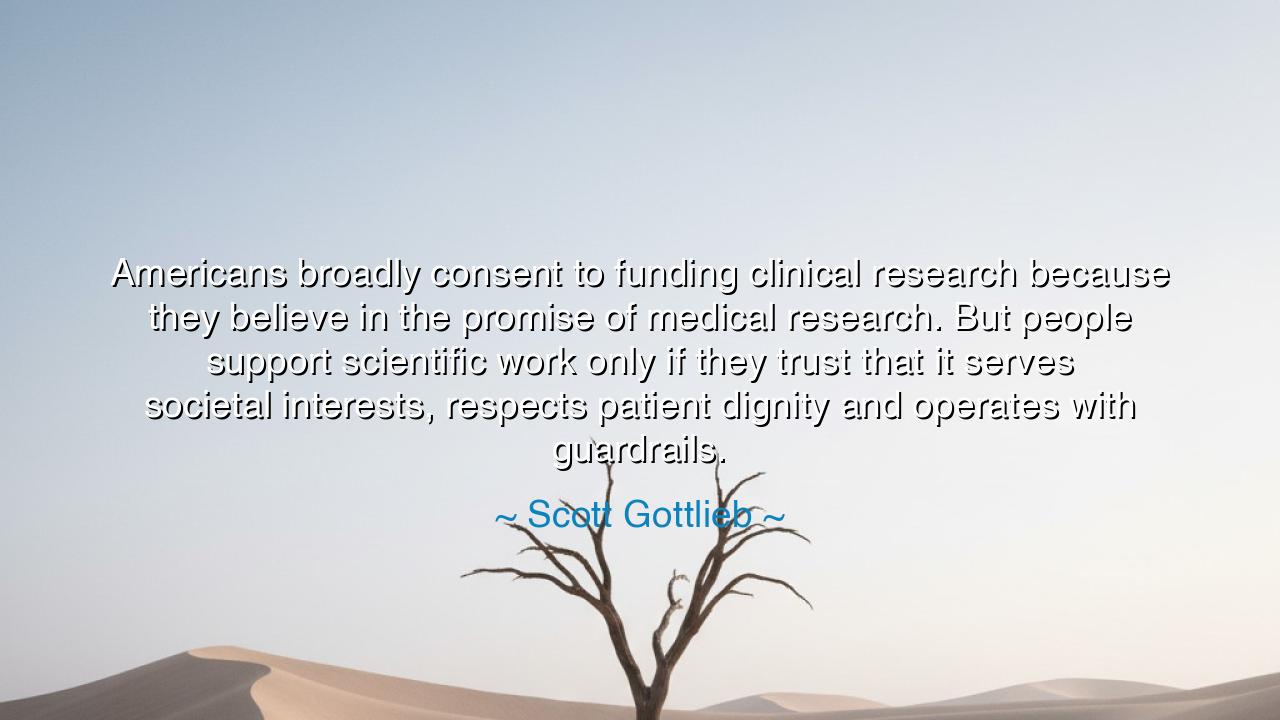
Americans broadly consent to funding clinical research because
Americans broadly consent to funding clinical research because they believe in the promise of medical research. But people support scientific work only if they trust that it serves societal interests, respects patient dignity and operates with guardrails.






"Americans broadly consent to funding clinical research because they believe in the promise of medical research. But people support scientific work only if they trust that it serves societal interests, respects patient dignity and operates with guardrails." — Scott Gottlieb
Hear, O listeners, the solemn wisdom of Scott Gottlieb, physician, scholar, and steward of public health. In these words, he unveils a truth that transcends laboratories and nations — the eternal bond between trust and knowledge. When he says that people “believe in the promise of medical research,” he honors the faith humanity places in science — the hope that through human ingenuity, the sick may be healed, the weak restored, the suffering relieved. Yet his warning is equally profound: that this faith, fragile as glass, rests upon a single foundation — trust. Without it, the great temple of science crumbles, and progress itself loses its moral compass.
The origin of this wisdom lies in the long history of medical discovery, where triumph and tragedy have always walked hand in hand. Gottlieb, as a leader of the U.S. Food and Drug Administration, saw the intricate web that binds scientific advancement to public faith. He knew that the people, who fund research through their taxes and entrust their bodies to its experiments, must believe not only in the brilliance of the scientist but in the integrity of the system. For science, though powerful, is not a god — it is a servant of humanity. And like all servants of power, it must be guided by guardrails, by ethics and compassion, lest it wander into arrogance or abuse.
History bears witness to this truth. In the 20th century, the promise of medicine was stained by the Tuskegee syphilis experiment, in which poor African American men were deceived and denied treatment in the name of research. What began as a study of disease became a monument to betrayal. The people’s trust was shattered, and generations thereafter looked upon medical institutions with suspicion and pain. This is the shadow that Gottlieb invokes — a reminder that science without ethics is not progress but peril, and that even the noblest pursuit becomes corruption when it forgets the dignity of the human being.
Yet from that darkness arose light. Laws were written, committees formed, and codes of ethics born — among them, the Belmont Report, which established the pillars of respect, beneficence, and justice in human research. These are the “guardrails” Gottlieb speaks of — not chains to bind science, but boundaries to keep it honorable. For true freedom is not the absence of limits, but the presence of conscience. When research honors these principles, it fulfills its sacred covenant with society: to heal without harm, to discover without deceit, to serve without exploiting.
To respect patient dignity, as Gottlieb commands, is to remember that every subject in a study is not a specimen, but a soul — a person with fears, hopes, and rights. The ancient physician Hippocrates once swore, “I will use treatment to help the sick according to my ability and judgment, but never with a view to injury and wrongdoing.” Across centuries, this oath still guides the modern scientist. For no discovery, however great, can justify cruelty; no innovation can excuse injustice. It is not science alone that defines civilization, but the moral spirit that governs it.
In his quote, Gottlieb also touches upon a deeper, often overlooked truth: that the power of science depends on the consent of the people. The scientist may wield knowledge, but society grants the authority to use it. When that trust falters, even the most promising research withers. We saw this in recent years, when fear and misinformation clouded faith in vaccines and medicine. The lesson is clear — transparency, humility, and honesty are as vital to science as data and discovery. Only when people see that research serves societal interests, not private ambition, will they continue to sustain it.
So, O seekers of truth and progress, take this teaching to heart: knowledge must always walk hand in hand with virtue. Let the scientist be guided not only by curiosity but by conscience. Let the citizen, too, remain watchful — questioning, but not cynical; trusting, but not blind. Each must play their part in maintaining the covenant of faith between discovery and decency. Support research that uplifts humanity, but demand that it remain just, compassionate, and transparent.
For in the end, as Gottlieb reminds us, science is not merely a tool of intellect but an act of trust. It is a bridge between the known and the unknown, built upon the faith that those who seek knowledge do so to serve, not to exploit. The future of medicine — and of civilization itself — depends upon this sacred balance. Guard it well, for without it, the light of progress will flicker, and the promise of healing will fade into shadow. But with it, science becomes what it was always meant to be — a servant of humanity and a beacon of hope for generations to come.






AAdministratorAdministrator
Welcome, honored guests. Please leave a comment, we will respond soon